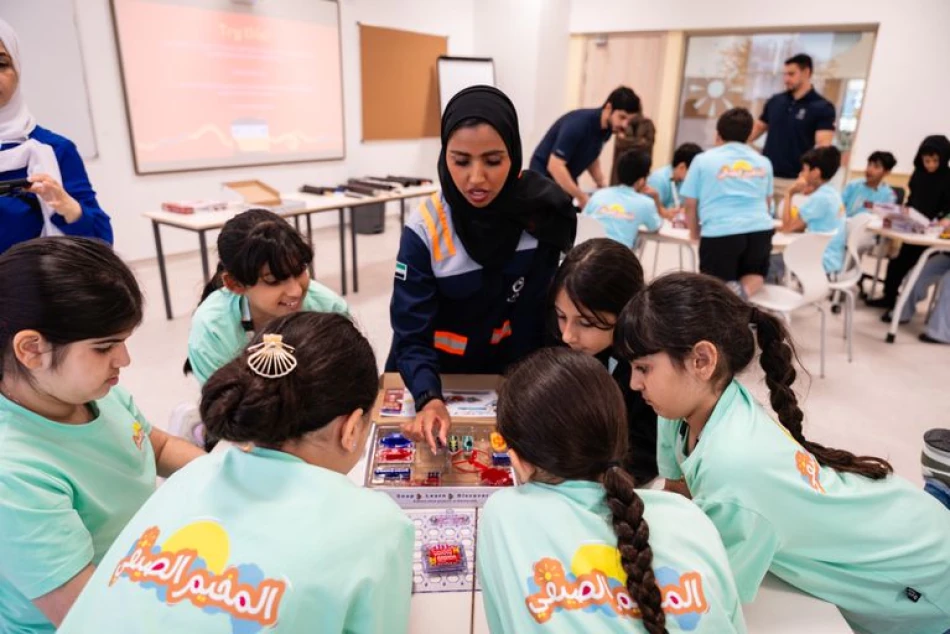
Dubai's Farjan and Al Ameen Conclude 3rd Exciting Summer Camp with 626 Young Participants
Dubai's Summer Camp Model: How Early Skills Training is Shaping the Next Generation
Dubai's third annual Summer Camp 2025 has concluded with a comprehensive program that trained 626 children aged 5-15 across four key areas: practical skills, emergency response, cybersecurity awareness, and cultural heritage preservation. The initiative, organized by Farjan Dubai and Al-Ameen Service, represents a strategic approach to youth development that other regional cities are likely to study and replicate.
A Holistic Approach to Child Development
The camp delivered 600 workshops across Dubai schools in Al-Khawaneej and Al-Barsha districts, focusing on practical life skills that traditional education systems often overlook. Children learned agriculture, cooking, carpentry, and soap-making—skills that build both confidence and real-world capabilities.
This hands-on approach reflects a growing global trend where cities recognize that academic education alone isn't sufficient. Singapore's SkillsFuture initiative and Finland's phenomenon-based learning programs share similar philosophies, emphasizing practical competencies alongside traditional subjects.
Emergency Response Training for Young Citizens
The "Little Dubai Heroes" component taught children fire safety protocols and first aid procedures—skills that could prove invaluable in emergency situations. This practical safety training mirrors successful programs in Japan, where earthquake preparedness is taught from kindergarten, creating a more resilient population.
Cybersecurity Education: A Growing Necessity
Twenty-two specialized workshops focused on digital safety, teaching children to recognize online fraud and avoid predatory behavior. The camp included supervised gaming sessions with real-time messaging about stranger danger in chat rooms—a proactive approach to digital literacy that many Western countries are still developing.
This early intervention strategy addresses a critical gap. With the UAE ranking among the world's most digitally connected societies, preparing children for online threats is becoming as essential as traditional safety education.
Cultural Preservation Through Active Learning
The heritage component taught traditional Emirati practices including razfa dance, burqa-making, incense production, and Arabic coffee preparation. This cultural education strategy serves dual purposes: preserving national identity while building pride in local traditions.
Similar programs in South Korea and Ireland have successfully maintained cultural continuity despite rapid modernization, suggesting Dubai's approach could strengthen social cohesion as the emirate continues its rapid international growth.
Entrepreneurship Training: Building Tomorrow's Business Leaders
The "Little Moguls" platform allowed 50 children to sell their own products, learning fundamental business concepts through direct experience. This early entrepreneurship education aligns with the UAE's broader economic diversification strategy, which requires a generation comfortable with innovation and risk-taking.
Research from countries with strong entrepreneurship cultures, including Israel and the Netherlands, shows that early business exposure significantly increases adult entrepreneurship rates. Dubai's systematic approach to youth business education could yield substantial economic benefits within the next decade.
Government Investment in Human Capital
The program's structure reveals significant institutional coordination. Multiple government entities—including Dubai's Community Development Authority, Knowledge and Human Development Authority, and Roads and Transport Authority—participated alongside private sponsors like Emirates Islamic Bank and telecommunications company Du.
This multi-sector collaboration demonstrates how Dubai approaches human capital development as a strategic priority rather than merely a social service. The involvement of 90 volunteers from across Dubai also suggests strong community buy-in for the initiative.
Implications for Regional Development
Omar Al-Falasi from Al-Ameen Service emphasized that building security awareness from childhood represents "strategic investment in society's future." This long-term thinking reflects Dubai's broader approach to development planning, where current investments are designed to pay dividends decades later.
Alia Al-Shamlan from Farjan Dubai noted the program's focus on practical skills that children need in daily life, moving beyond entertainment toward genuine capability building. This philosophy could influence educational policy across the Gulf region, where governments are increasingly focused on preparing citizens for post-oil economies.
A Replicable Model
Dubai's comprehensive approach—combining practical skills, safety education, cultural preservation, and entrepreneurship training—creates a template that other cities could adapt. The program's success in its third year suggests it has moved beyond experimental status to become an established part of Dubai's youth development infrastructure.
As regional governments grapple with preparing young populations for rapidly changing economies, Dubai's systematic approach to childhood skill development offers a practical roadmap for building more capable and resilient societies.
Most Viewed News

 Sara Khaled
Sara Khaled






